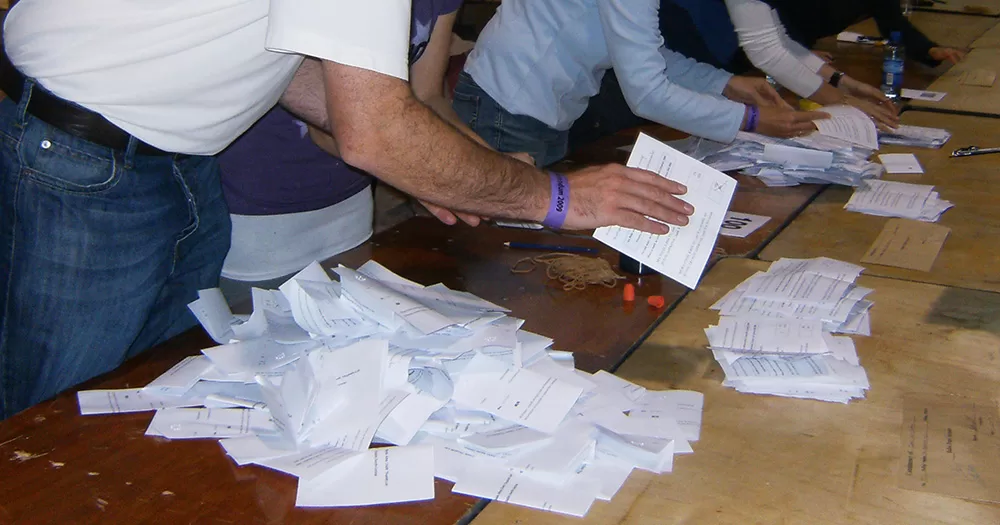The Irish government has confirmed plans to hold two referendums next year regarding constitutional references to family and care. They will both be held on March 8, 2024, coinciding with International Women’s Day.
The first referendum applies to the 39th Amendment.
Currently, Article 41.1.1 recognises “the Family as the natural primary and fundamental unit group of Society, and as a moral institution possessing inalienable and imprescriptible rights, antecedent and superior to all positive law.” If approved, it would be updated to expand the definition of family, including the words “whether founded on marriage or on other durable relationships”.
Article 41.3.1, which presently reads, “The State pledges itself to guard with special care the institution of Marriage, on which the Family is founded, and to protect it against attack,” would also be updated to remove the words “on which the Family is founded”.
Speaking about the changes, Taoiseach Leo Varadkar said they would ensure protections “are not limited to the marital family” and added that this “protective shield or canopy” would allow for the inclusion of families headed by lone parents, grandparents or guardians, for example. He also acknowledged that some families are founded “on lasting relationships other than marriage”, and the edits would “enable the Constitution to catch up with contemporary reality”.
The second referendum applies to the 40th Amendment, regarding the role of women in the home and the recognition of all those who provide care.
It proposes the deletion of Article 41.2, which proclaims that the State shall “endeavour to ensure that mothers shall not be obliged by economic necessity to engage in labour to the neglect of their duties in the home.” It would be replaced with Article 42B, which says, “The State recognises that the provision of care, by members of a family to one another by reason of the bonds that exist among them, gives to Society a support without which the common good cannot be achieved, and shall strive to support such provision.”
The news comes after the Citizen’s Assemble and Oireachtas Committee on Gender made three recommendations to the government regarding the wording of the Constitution, with two of these being taken on board.
The unsuccessful third proposal aimed to amend Article 40.1 “to refer explicitly to gender equality and non-discrimination”. Varadkar cited legal advice as a reason to not move forward with this suggestion, saying the change “could weaken the all-encompassing commitments to equality within the Constitution” which ensures that “All citizens shall as human persons be held equal before the law”. He cautioned that by elevating “any particular category”, others, such as race or disability, could “unwittingly” be downgraded.
The Taoiseach stressed that the Irish Government took all recommendations “very seriously” and noted that “there has been some criticism” regarding the time taken to move forward with the referendums. He continued saying that changed to the Constitution “should not be taken lightly,” and that public debate should be conducted in a “respectful manner”. Varadkar also vowed that the Government will “push back strongly against disinformation and distraction from any source”.
Welcoming the referendums on the wording of the Irish Constituion, Minister Roderic O’Gorman stated that it “marks another key milestone on our journey towards becoming more caring, inclusive society”.
“The key is that women choose the role they play in Irish society, and not just take on one assigned to them by voices from the past.”
– Green Party Minister for Equality, @rodericogorman welcomes ‘ground-breaking’ referendum wording on family and carehttps://t.co/PCYsEs40Qq
— Green Party Ireland (@greenparty_ie) December 5, 2023
“After decades of deliberation, we are finally offering the people the opportunity to remove the archaic and sexist reference to women in the home, which has contributed nothing to the good of women’s lives in this country other than to limit their choices,” he added.
“A woman’s place is wherever she wants to be, in the workplace, in education, or in the home. The key is that women choose the role they play in Irish society, and not just take on one assigned to them by voices from the past.”
He concluded that “it is also important that we don’t lose sight of the vital role that care and caring relationships play in knitting together the fabric of our society. It is long past time that we recognise the invaluable contribution that caring – the quiet dedication of so many family members around Ireland – provides to this country.”
© 2023 GCN (Gay Community News). All rights reserved.
Support GCN
GCN is a free, vital resource for Ireland’s LGBTQ+ community since 1988.
GCN is a trading name of National LGBT Federation CLG, a registered charity - Charity Number: 20034580.
GCN relies on the generous support of the community and allies to sustain the crucial work that we do. Producing GCN is costly, and, in an industry which has been hugely impacted by rising costs, we need your support to help sustain and grow this vital resource.
Supporting GCN for as little as €1.99 per month will help us continue our work as Ireland’s free, independent LGBTQ+ media.
